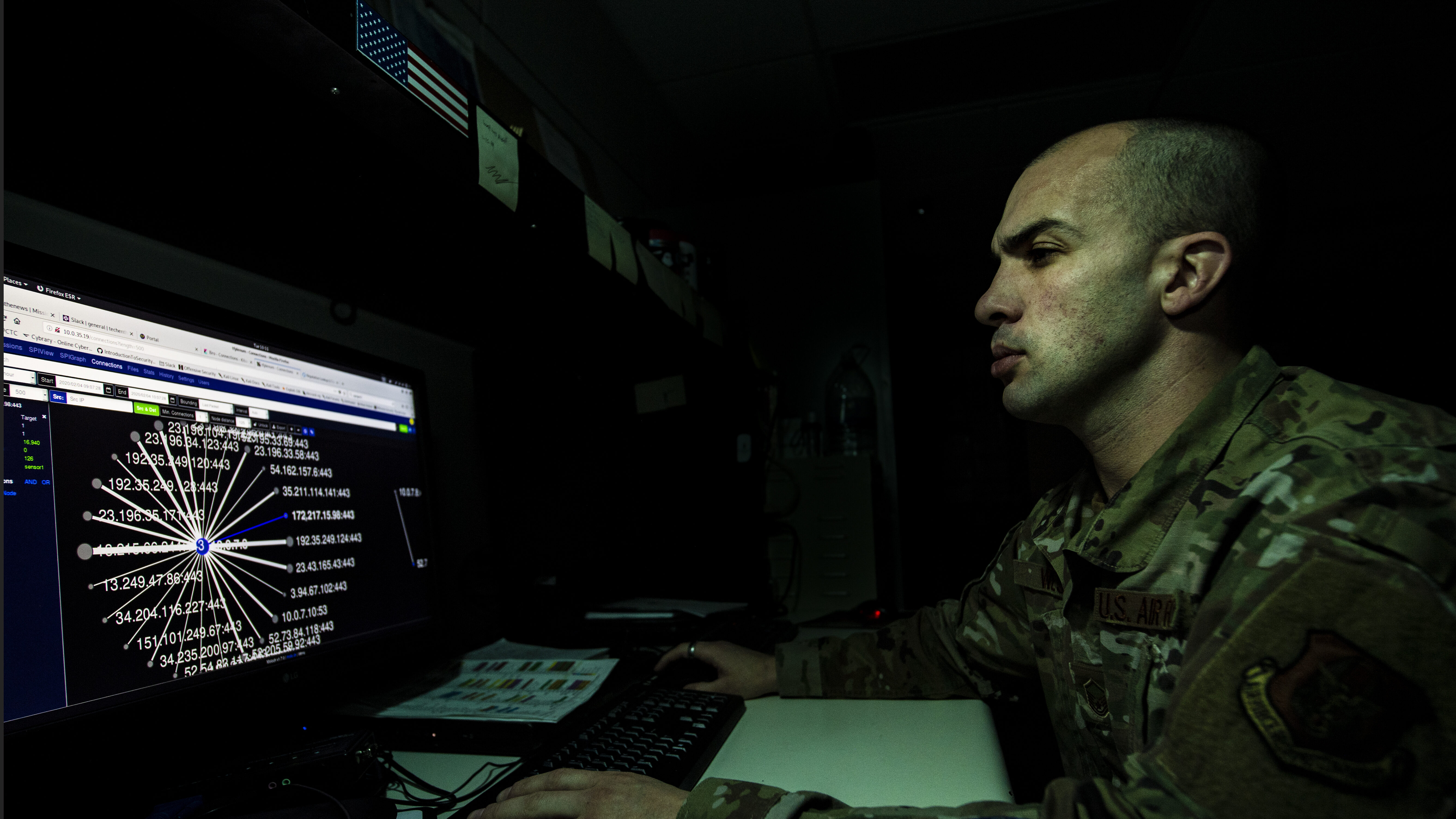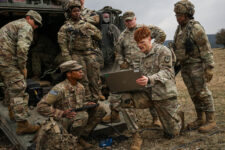
Managing digital operations in space is a major concern for experts. (Joshua J. Seybert / Air Force)
WASHINGTON: More than any other threat, cyber attacks are the greatest concern for the US national security enterprise in the next five years, according to the results of the first ever Breaking Defense Space Survey.
The online survey, which ran from mid-August to mid-September, polled almost 500 space professionals on a variety of topics, including the greatest threats to America’s space ambitions, the growing role of the Space Force, and what space capabilities need the most investment going forward.
Roughly a third of the respondents identified themselves as being in military or government, while two-thirds identified themselves as defense/space industry or government contractors. Thirty-five percent identified themselves as an “Executive, Senior Management, Director, or equivalent,” with another 27% identifying themselves as “Manager, Program Manager, Technical Manager or equivalent.”
While the idea of space-based kinetic warfare captures the public imagination, the professionals polled for this survey highlighted cyberattacks as the “greatest challenge” to for US security in orbit and beyond.
RELATED EXCLUSIVE: Imagery Industry Seeking Direct DoD Sales In Wake Of Tiny NRO Bid
Overall, 35% of respondents listed cyber as the greatest concern, easily outpacing the next closest response, domestic politics, at 22%. That concern jumps to 47% when looking just at members of the Defense Department — those who are actively involved in day-to-day operations and may have a better sense of the kind of cyber activities other nations are playing with.
Given those concerns, it’s not surprising that 75% of overall respondents listed cyber security as “extremely important” for space systems — and not a single respondent said it wasn’t important at all.
Brian Weeden, head of program planning at the Secure World Foundation, told Breaking Defense that satellites are “increasingly becoming complex computer systems controlled by networks of computers on the ground and communicating with computer systems held by end users.” As a result, “any point in that system can be attacked, and in most cases more cheaply and easier than developing an anti-satellite weapon.”
RELATED: Full Coverage Of The Breaking Defense Space Survey
It’s certainly a threat DoD is aware of, said Justin Johnson, who held a number of Pentagon space roles in the Trump administration, concluding as the acting assistant secretary of defense for space policy.
“In both daily competition and in conflict, cyber security has to be a top priority, for DoD writ large and for space systems specifically,” said Johnson, who stressed he was speaking solely as a former official and not in his current industry role. “In many ways, degrading, disrupting, or disabling a space capability via cyber is much more attractive to a potential adversary. It may be deniable or reversible, and it does not damage the space ecosystem in the same way that an ASAT missile would create a space debris cloud.”
To Classify Or Not To Classify
Relatedly, there seems to be a split in the space community about greater transparency when it comes to space-based threats and capabilities.
Just under 50% of respondents reported that threat information to space systems should be disclosed or unclassified more often, with 33% saying it should not and the remainder “not sure” of their stance. Those numbers remain about the same if broken down by either DoD officials or industry.
RELATED: US Must Build Space ‘Superhighway’ Before China Stakes Claim, Senior Space Force Officer Says
However, almost 58% of respondents believe that American offensive space-based capabilities should not be declassified, with only 23% calling for great transparency of those systems. Interestingly, defense officials are 10% more likely to call for declassifying offensive space systems.
The survey results come at a time that DoD is grappling with the question of over-classification, with Gen. John Hyten, the vice chairman of the Joint Chiefs of Staff, leading the charge. As Breaking Defense first reported, Hyten is pushing declassify the existence of a secret space weapon program and provide a real-world demonstration of its capabilities.
Said Johnson, “There is no question in my mind that space has been over-classified for a long time. The hard task is finding the right balance going forward. The American people and our friends and allies need to understand the threats we face in space.”
“Multiple US administrations have made it a priority to deter attacks against US space assets and establish norms of responsible behavior in space,” Weeden noted. “Given those priorities, I think the US needs to be more open about its offensive capabilities, although it should keep a lot of the specifics classified like we do in other domains. We talked about the existence of submarines and stealth bombers, but not how fast they can go or how stealthy they really are.”
Another area of the poll covered concerns about how DoD is handling its data related to space. A frequent line from DoD officials is that the department is drowning under a “tsunami of data,” where the Pentagon has plenty of assets to gather information but doesn’t know how to really handle it.
That concern is reflected in that 47% of respondents ranked the US national security enterprise’s current data-processing posture as adequate, just barely out-polling “poor” at 44%. Less than 10% of respondents said it was “good.” And industry seems less impressed than DoD with its capabilities; where 37% of DoD respondents reported that the current posture is poor, 46% of contractor respondents gave that low grade.
For his part, Weeden thinks the respondents may be too positive, putting himself firmly in the “very poor” category, in part due to multiple failed acquisition efforts over the last two decades that have left the data infrastructure in bad shape.
Keep an eye on Breaking Defense for the next few weeks as we roll out further findings from the space survey.






















